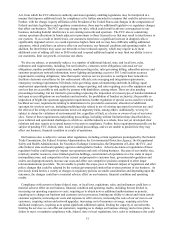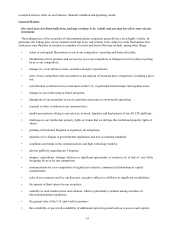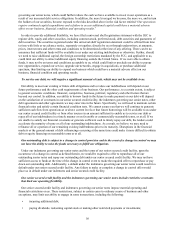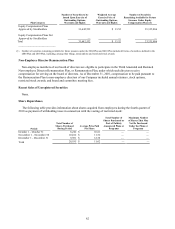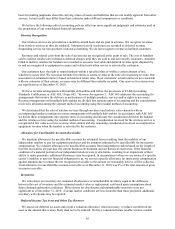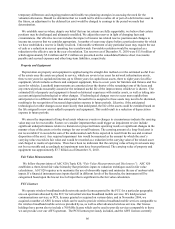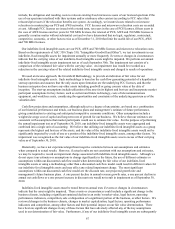Metro PCS 2010 Annual Report Download - page 67
Download and view the complete annual report
Please find page 67 of the 2010 Metro PCS annual report below. You can navigate through the pages in the report by either clicking on the pages listed below, or by using the keyword search tool below to find specific information within the annual report. 57
• selling or buying assets, properties or licenses;
• developing assets, properties or licenses which we have or in the future may procure;
• creating liens on assets;
• participating in future FCC auctions of spectrum or private sales of spectrum;
• engaging in mergers, acquisitions, business combinations, or other transactions;
• merging, consolidating or disposing of assets;
• entering into transactions with affiliates; and
• placing restrictions on the ability of subsidiaries to pay dividends or make other payments.
Under the senior secured credit facility, we are also subject to financial maintenance covenants with respect to our
senior secured leverage and in certain circumstances total maximum consolidated leverage and certain minimum
fixed charge coverage ratios. These restrictions could limit our ability to obtain debt financing, repurchase stock,
refinance or pay principal on our outstanding debt, complete acquisitions for cash or debt or react to changes in our
operating environment or the economy. Any future debt that we incur may contain similar or more restrictive
covenants.
Any failure to comply with the restrictions of the senior secured credit facility or the indentures governing our
senior notes, or certain current and any subsequent financing agreements may result in an event of default under
these agreements, which in turn may result in defaults or acceleration of obligations under these agreements and
other agreements, giving our lenders the right to terminate any commitments they had made to provide us with
further funds and to require us to repay all amounts then outstanding.
Our substantial indebtedness could adversely affect our business, financial condition and operating results and
our senior creditors would have a prior secured claim to any collateral securing the debt owed to them.
Our ability to make payments on our debt, to repay our existing indebtedness when due, and to fund operations
and significant planned capital expenditures will depend on our ability to generate cash in the future. Our ability to
produce cash from operations is subject to a number of risks, including:
• introduction of new products and services by us or our competitors or changes in service plans or pricing
by us or our competitors;
• our ability to maintain our current cost structure; and
• our ability to continue to grow our customer base and maintain our projected levels of churn.
Our substantial debt service obligations could have important material consequences to you, including the
following:
• limiting our ability to borrow money or sell stock to fund working capital, capital expenditures, debt
service requirements, acquisitions, technological initiatives and other general corporate purposes;
• making it more difficult for us to make payments on our indebtedness;
• increasing our vulnerability to general economic downturns and industry conditions and limiting our ability
to withstand competitive pressure;
• limiting our flexibility in planning for, or reacting to, changes in our business or the telecommunications
industry;
• limiting our ability to increase our capital expenditures to roll out new services or to upgrade our networks






